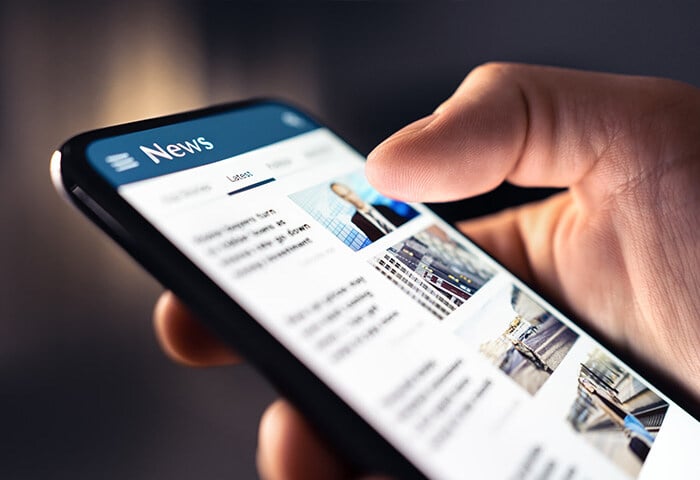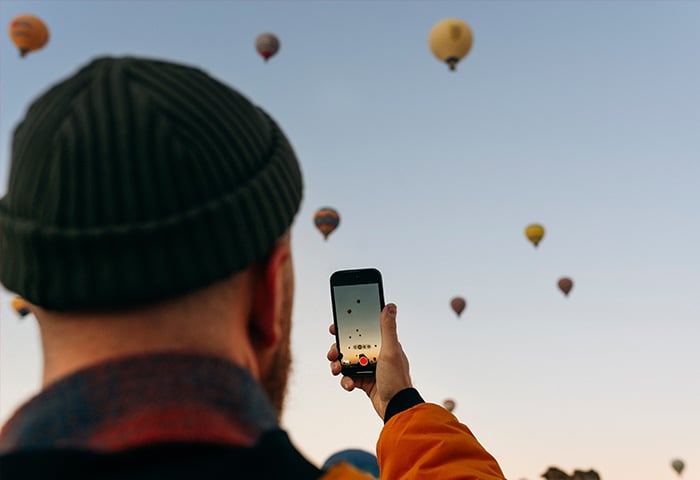Too much of a coincidence?
“I complained to my wife about back pain due to our old bed and then the next day: ads for mattresses were on my Facebook.”
“I told my coworker I might want to take a trip and then — boom, flight ads.”
“I talked about Cady Heron wearing army pants and flip flops… so then I got an ad for army pants and flip flops.”
The internet is full of stories like this. Read enough of them, and it seems inevitable that Facebook must be listening to us through our phones. How else could it advertise things we discussed?
Is this just a bunch of weird coincidences, paranoia, or a large-scale privacy invasion?
Facebook’s official policy
Facebook has stated many times that they absolutely, 100%, do not listen to users through their phones — for what it’s worth. It’s up to you if their word is worth anything — after all, Facebook has been embroiled in scandal after scandal of data breaches and privacy issues. That said, most security experts believe that Facebook is not actually listening to us, for a few reasons.
Would it be technologically feasible?
Antonio García Martínez, the former leader of Facebook’s targeted ads division, published an article aiming to debunk this phenomenon. His chief argument was essentially that Facebook eavesdropping in this manner would not be technologically feasible for a few reasons.
First, for Facebook to listen in on our conversations and use them as fodder for targeted ads, the company would have to be constantly recording everything all of the time. That would require an extreme amount of data storage, which Facebook doesn’t have. And researchers at Northeastern University have tested it and found that there’s no evidence of the Facebook app making audio transfers — i.e., the app isn’t sending any audio back to the company that could be turned into ads.
Further, human speech is unimaginably complex, and it’s hard to imagine that Facebook has developed the ability to parce our language accurately, sift through sarcasm, metaphors and slang; correctly deduce exactly what we want; and then serve up an ad right away.
What alternative explanations are there?
While we don’t think Facebook is eavesdropping on everything you say, it’s undeniable that it feels creepy when you discuss a random or unusual topic and then see a related ad soon after. So what could actually be behind these eerie coincidences?
You actually already saw the ad
It’s possible that you actually saw the ad before having the conversation. For example, you might have seen an ad for something (in the grand sea of ads floating around the internet) and it didn’t really register. Perhaps it was an ad for a particular vacation destination. Later, something else makes you think about taking a trip (noticing that it’s a sunny day, for example) and then you bring up the idea of summer travel with a colleague. Later, you see the same ad for vacation spots again and you (mistakenly) believe that the conversation triggered the ad.
Confirmation bias
Confirmation bias is the (extremely common) psychological heuristic by which we look for confirmation of what we already believe, rather than analyzing information objectively. We have plenty of conversations about products or services and 99% of the time we don’t see a related ad immediately after. But for the 1% of the time we do see a related ad, we view it as “proof” because we are just looking for evidence to confirm the hypothesis we already had.
It really is just a coincidence
It’s more visible to us when we do see an ad that relates back to a previous conversation. Of course we don’t notice all of the other times it doesn’t happen.
Facebook serves you ads for what your friends search for
Some of the most valuable information Facebook collects from you is who you know. The company keeps data on who your real friends are (and certainly knows who you actually hang out with out of the hundreds or thousands of “friends” you have on the app). And Facebook uses your friends’ interests — in events, products, or ideas — to suggest things to you. So if you discuss a product in-person with a friend, and they then search for it, that can result in you getting “creepy” ads for something that you never searched for.
Facebook knows so much about us, they don’t need to eavesdrop
One of the main reasons we believe that Facebook isn’t listening to us is that they simply don’t need to. Facebook has all of our data already.
First of all, Facebook is already designed to be a data mine. Users punch thousands of pieces of their personal information into the app: who our friends and family are, what we’re interested in, where we’re going, what books and movies we like, pictures of who we spend time with and what we’re doing, status updates, when we’re traveling, where we’re shopping, and on and on.
But more than that, Facebook knows a huge amount about your online behavior, even beyond what you do on their site. Remember Antonio García Martínez, mentioned above? He was the creator of the Facebook Pixel. This is an innovation in tracking technology that allows advertisers to follow you around the web, whether or not you’re currently signed into Facebook at the time or not. Millions of websites have this Pixel, a tiny piece of code, that records all kinds of data: which websites you visit, everything you buy online, things you consider buying but then don’t, and more. This allows Facebook to build an extremely detailed profile about you and allows advertisers to “retarget” you — i.e. serve you ads for those products you considered buying but didn’t.
And even more than that, Facebook also knows a ton of offline information about you too. Up until 2018, Facebook was buying information from data brokers (such as Equifax — remember them?), like how much money you make, your marital status, what type of home you live in, your credit score, if you’ve ever been involved in a lawsuit, and lots more sensitive information. These data companies also run loyalty programs for stores, so they even know your common purchases at physical shops like supermarkets and pharmacies.
Facebook’s algorithms put all of the above information together and they know everything they need to, including predicting the future with a scary amount of accuracy. Facebook knows so much that it can easily anticipate what we’ll do next, where we’ll go next, what we’ll probably need and want to buy.
What are the implications of Facebook knowing so much?
So, even if Facebook probably isn’t listening to us through our phones, they’re still spying on us. This can be hugely problematic. On a personal level, Facebook knows the intimate details of our lives and uses it to make billions of dollars off of us every year. On a societal level, there can be enormous ramifications when this data is breached — as it was in the Cambridge Analytica scandal, where a private company scraped Facebook data on a mass scale and used it to influence major worldwide events like the 2016 US Presidential Elections and Brexit.
So what can you do?
One way to make sure Facebook isn’t getting a creepy amount of information on you is to stop using it. That may not be realistic for many of us, however. If you use Facebook to communicate with relatives or keep up with faraway friends, you’re probably unlikely to get rid of the service completely. And, Facebook collects shadow profiles on people who don’t even use their app, so it may not be possible to fully hide from the behemoth unless you want to totally quit the internet (yeah, we didn’t think so). But, there are a few things you can do to reduce how much information Facebook gets on you.
Disable microphone and location permissions
Again, Facebook probably isn’t listening to you through the microphone. But if it makes you feel better, you can disable the app from using the microphone. Go into your phone’s Settings, and then find App Permissions. Look for Microphone and toggle off for both Facebook and Facebook messenger. Note that if you do this, some features might not work properly: for example, recording a video directly to Facebook. While you’re there in settings, you might as well go to Location and disable that too, so Facebook can’t follow your device’s physical location.
Dial in your privacy controls
On the Facebook app, go to Settings, then Ads, then Ad Settings, and you’ll have a few options.
-
Under “Ads based on data from partners” (i.e. data that advertisers provide about your activity outside of Facebook) — check not allowed.
-
Under “Ads based on your activity on Facebook Company Products that you see elsewhere” (i.e. using your data to display ads on websites and apps across devices such as computers, mobile phones and connected TVs) — check not allowed.
-
Under “Ads that include your social actions” (i.e. showing ads to your friends based on actions you take, such as liking a Page or sharing a post) — check share with no one.
On this same page, you can also click Your Information to see what categories Facebook has you in for advertisers.
-
Under “About you” you can choose to share or hide various info (like your relationship status, employer, education level, and more) that advertisers can use to reach you. Click the blue button on the right to hide each one.
-
Under “Your categories” you’ll see more ways Facebook identifies you (like “recent device change” and “Wi-Fi user”). Click the X in the right of the box to remove each category.
While you’re in settings, you can also go over to Apps and Websites. Here you can see any app you clicked “log in with Facebook” (rather than creating a unique username and password). You might be surprised to see how many external apps are still logged in. Here you can delete these apps or limit their access to your data.
Communicate with friends and family more privately
Facebook claims it doesn’t use what you type in Messenger to serve up ads, but it does have the ability to read your chats. All things considered, you might want to switch to a more private way to message. Also, if you disable microphone access on Facebook messenger, you obviously will not be able to use the app to make calls. Check out our guide to the most private way to message.
Use anti-tracking software
Make sure the Facebook Pixel isn’t tracking you around the web by using an anti-tracking software. You’ll want to choose a program that will prevent tracking attempts, show you which websites are tracking you around the web (hint: it’s not just Facebook), and prevent corporations from serving you targeted ads or raising prices on items you’ve been looking at, like flight tickets. Oh, and what a coincidence: we happen to have just the thing for that!
Whether or not you’re convinced that Mr. Zuckerberg doesn’t have an ear directly into your private conversations, we hope you’ve learned something about the vast amount of personal information Facebook knows about you and how to limit it. Even though the internet abounds with stories of people complaining that Facebook is listening to them, most of the grumblers still don’t seem to be ready to quit the ‘book. So if you keep using it (we’re not judging you), make sure you’re at least being more guarded with your personal information.















